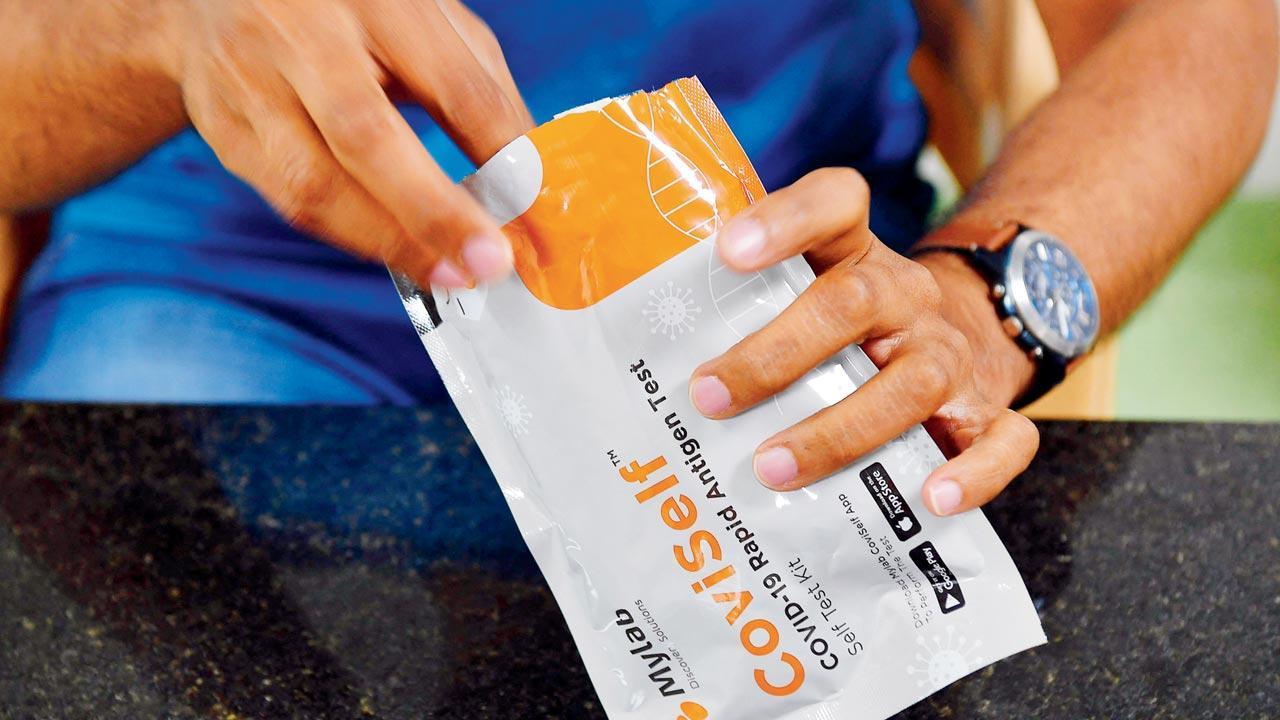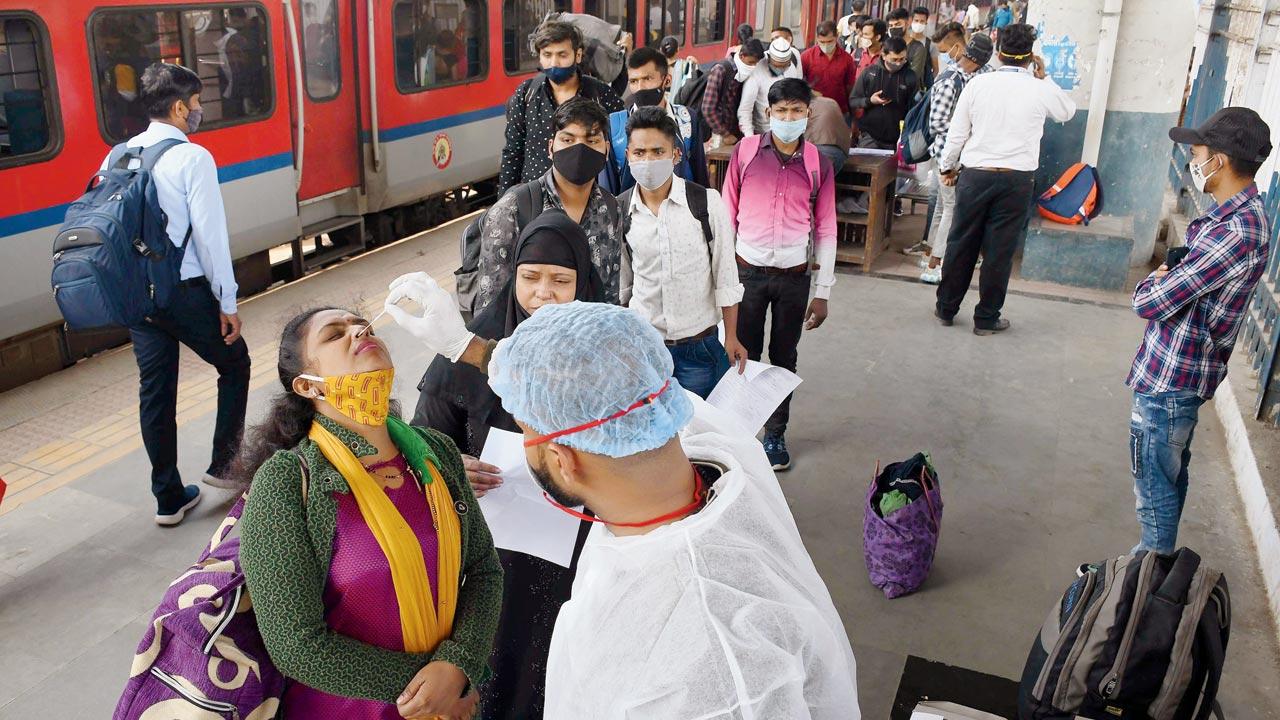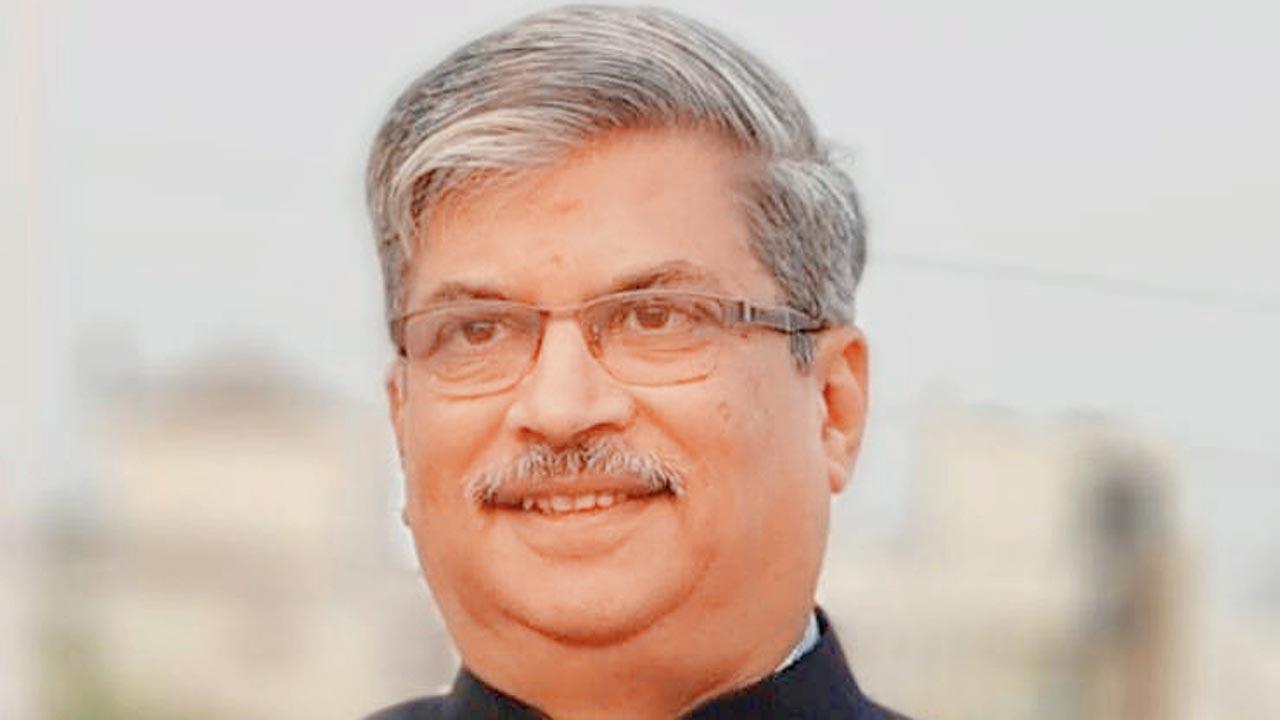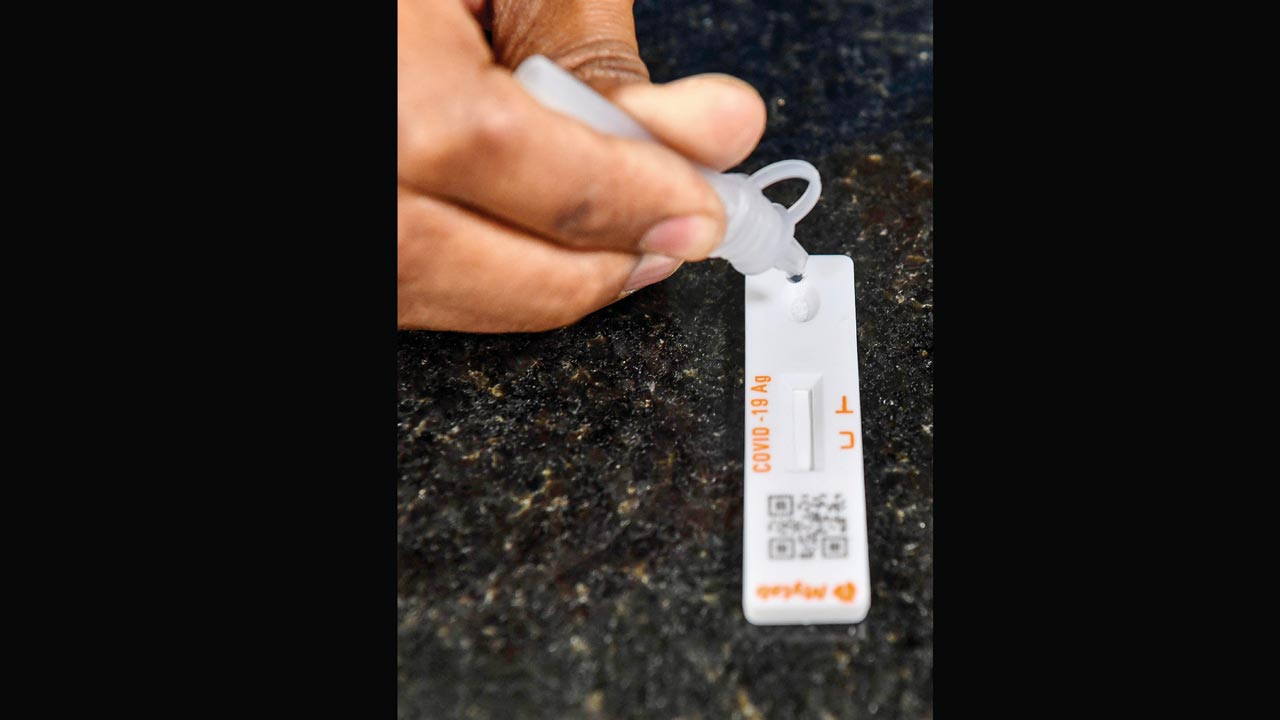IMA president points out urgent need to monitor sale of over-the-counter COVID testing kits; says this could be behind a large number of positive cases going unreported, lulling Mumbai into dangerous complacency

CoviSelf is one of the self-test kits available in the market
Amid the third COVID-19 wave, the self-test kits are selling like hotcakes, raising serious concerns like infections going unreported. Experts and the chemist association are also worried about the dangers of missing out on positive results, as home-test kits are likely to give a negative report if the viral load is low. The sales of such kits have jumped over 100 per cent, and is a cause for concern considering the massive fall in daily cases in Mumbai recently. Until last week, the city was reporting over 20,000 fresh infections, but over the past few days, the number had dropped to about 11,000. The BMC is working on a circular to monitor the sale and results of the kits.
ADVERTISEMENT
The Retail & Dispensing Chemists Association has asked all its members to maintain a record of the sales of self-test kits, and has also appealed to the government to look into the matter. Its president Prasad Danave said, “There has been a surge of more than 100 per cent in the sale of the self-test kits. The kits are selling like hotcakes and are beyond the control of the pharmacists. We are anticipating certain orders from the government to regulate the sale, and have asked our members to keep a record of the buyers.”
 A passenger is tested at Dadar station on Wednesday. Doctors, experts urge people to rely on RT-PCR tests instead of home-test kits. Pic/Ashish Raje
A passenger is tested at Dadar station on Wednesday. Doctors, experts urge people to rely on RT-PCR tests instead of home-test kits. Pic/Ashish Raje
Currently, eight to 10 brands of self-test kits are in the market, including CoviSelf, manufactured by Pune-based Mylab Discovery Solutions, which was first approved by the Indian Council of Medical Research (ICMR) in May 2021. These kits, which provide results in 15-20 minutes, cost anywhere between Rs 220 and Rs 500.
Experts said that one of the reasons behind the increase in sales of self-test kits could be the delay in booking RT-PCR tests and delivery of reports. Several people are down with symptoms similar to common cold and suspecting COVID-19, they are relying on home-test kits.
 Dr Suhas Pingle, president, IMA-Maharashtra
Dr Suhas Pingle, president, IMA-Maharashtra
Appeal to government
Noticing the trend, the Maharashtra branch of the India Medical Association (IMA) has written to the state government, requesting immediate steps to have a mechanism for auto reporting of test results. It stated that self-test kits are being used on a large scale by people. The medical body has also cautioned people against self-medication.
 There are about 8-10 self-test kits in the market, and CoviSelf is one among them. File pic/AFP
There are about 8-10 self-test kits in the market, and CoviSelf is one among them. File pic/AFP
“These are being marketed as approved test kits for quick results. It is authorised for non-prescription self-testing at home. They are easy to use and aimed at producing rapid results,” Dr Suhas Pingle, president, IMA-Maharashtra, told mid-day.
However, it is crucial to report the test results, the IMA-Maharashtra pointed out. “On many occasions, it has been observed that self-tests go unreported,” said Dr Mangesh Pate, secretary, IMA-Maharashtra.
Suggesting a mechanism for a database for these results, Dr Pingle said, “Allocating every self-test kit with QR or barcodes and linking it to a unique identification number will set the system to obtain results for every kit. Reporting data of all results is seriously significant during pandemic management. We request that the government take immediate steps to safeguard this important aspect in home testing for COVID-19.” The doctors have cautioned people against completely relying on self-test kits, as often the result may come back negative. An RT-PCR test, however, could give a positive result.
Risk of self-medication
“People self-testing at home should not forget that if they test negative, they are supposed to undergo an RT-PCR test in case there are even mild symptoms. It is observed that people don’t follow this rule and try self-medication. Even though the Omicron variant is seen to be milder, one should not self-medicate, and instead consult a doctor. If a person has COVID-19 symptoms, they should isolate and keep following COVID-appropriate behaviour,” said Dr Pate.
The BMC will on Thursday issue a circular to the distributors and pharmacists, asking them to maintain a record of the self-test kits. Additional Municipal Commissioner Suresh Kakani said they are making a special email address on which the pharmacists and distributors have to send the daily purchase record along with contact details of the buyers. “The information will then be distributed to the relevant ward war rooms, where members will call the buyers and check if the kits were used and the results were uploaded, etc,” he added.
A State COVID-19 Task Force member said the home testing kits are not a confirmatory test and people should use it only for screening. “The sensitivity of the self-test kits is much lower than that of the RT-PCR test. There is a high chance of missing out on positive cases if the viral load is low. It is important to get an RT-PCR test done,” he said.
‘O2 demand surging; hospitalisations to go up soon’
Admissions in COVID-19 hospitals will increase significantly in the last week of January or the first week of February, the health department has projected. The Cabinet was also informed on Wednesday that the demand for oxygen has also been increasing steadily.
Until Wednesday, the daily consumption of medical oxygen was 400 metric tonne (MT), which is 300MT less than the target the state government has set for imposing lockdown-like restrictions.
Chief Minister Uddhav Thackeray, after the Cabinet was informed about the developments, instructed officials to not be lenient in view of a sudden drop in the daily COVID-19 cases over the past couple of days.
He also noted that since the infection has reached the rural areas as well, those handling the health infrastructure needed to be sensitised and it strengthened further to meet the challenge.
A couple of hours after the meeting, the daily findings for Mumbai and other cities vindicated the caution given by the health department. The cases in the city increased by at least 5,000 in a day.
- Dharmendra Jore
 Subscribe today by clicking the link and stay updated with the latest news!" Click here!
Subscribe today by clicking the link and stay updated with the latest news!" Click here!







